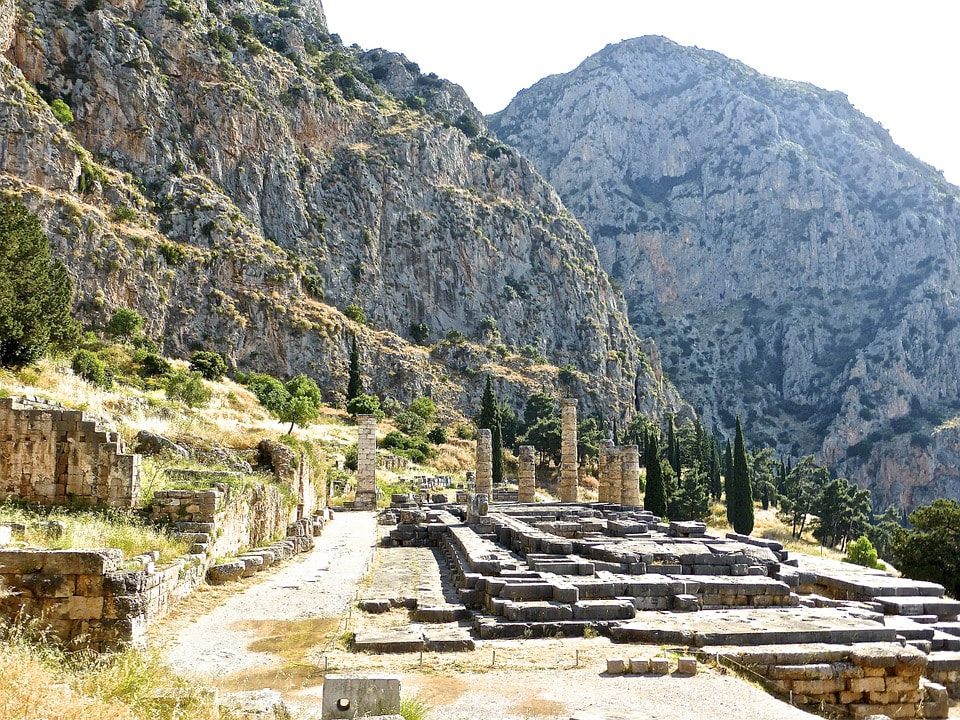|
Have you ever considered where the center of the world is? The ancient Greeks had no doubts because, for them, the center of the world was Apollo's Sanctuary in Delphi. There was located a special stone called omphalos - navel of the world. According to myth, Zeus released two eagles to fly from different directions, from east and west, and they met at the site of Delphi. Thus, Zeus decided that Delphi is the center of the world and omphalos was set on the exact spot where eagles met. Delphi was a very ancient Greek city inhabited as early as the 15th century BC. The Oracle at Delphi was also ancient and, according to legend, it belonged to goddess Gaea while the guardian of the Oracle was her son, the serpent known as Python. However, god Apollo slained the serpent god and founded his own oracle. This legend points to the historical facts about Delphi: although Apollo’s cult was introduced during the 8th century BC, the Oracle already existed but it was dedicated to Gaea, the Earth goddess. The Oracle at Delphi gained the greatest influence during the 6th century BC and it was not just important religious but also political center of the Greek world. The Olympic Games were not the only Panhellenic games and once in four years, all the Greeks were coming to the Pythian Games at Delphi. Unlike the Olympic Games in honor of god Zeus, the Pythian Games were held in honor of god Apollo and had athletic but also a very prestige musical contest.
However, the greatest glory of the Delphi was because of the Oracle. The Apollo’s prophetess was called Pythia and that was a woman over fifty years old. After becoming Pythia, she lived departed from her husband and had to wear maidan’s clothes. Before giving prophecies, Pythia had to take a bath and drink water from the sacred spring Cassotis. After that, she was entering the Apollo’s temple and descending into the basement cell where she was sitting on the sacred tripod which was set over the opening in the earth. While chewing laurel leaves, Pythia was inhaling fumes coming out from the opening under her feet and soon she would fall into a trance. During Pythia’s trance, male priests were writing down her words and turning them into the verses – the prophecies. Many Greeks and representatives of Greek cities were coming to Delphi searching for advice. The glory of the Oracle was known far beyond the Greek world and many foreign rulers were sending emissaries with gifts asking for prophecy. However, Pythia’s prophecies were not always clear but mostly ambiguous and the seeker had to unriddle the true meaning. One of the most famous ambiguous prophecies was the one given to the Croesus, the king of Lydia. Croesus did not like the strengthening of the neighboring Persian state and wanted to invade them. Before starting the war, he asked Oracle at Delphi about the outcome and Pythia gave the prophecy that, if he attacks Persia, a mighty empire will be destroyed. Croesus was very pleased with the prophecy and immediately attacked Persia but Persian king Cyrus the Great defeated Croesus’ army and captured him in 546 BC. However, the prophecy given by Pythia was fulfilled because Croesus really destroyed the mighty empire – his own.
0 Comments
Leave a Reply. |
AuthorPhoenix Voyagers Archives
January 2023
Categories |
|




 RSS Feed
RSS Feed




